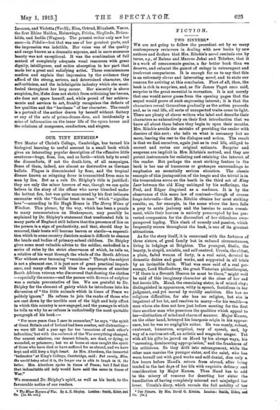OUR TINY ENEMIES.*
Tire Master of Christ's College, Cambridge, has turned his biological learning to useful account in a small book which gives an interesting popular description of the offensive little creatures—bags, fleas, lice, and so forth—which help to swell the discomforts, if not the death-lists, of all campaigns. Some of them, indeed, are almost as destructive as German ballet& Plague is disseminated by fleas, and the tropical disease known as relapsing fever is transmitted from man to man by lice. But as a rule Dr. Shipley's title is justified; they are only the minor horrors of war, though we can quite believe in the story of the officer who never blenched under the hottest fire, but was quite unmanned by his first intimate encounter with the "familiar beast to man" which "signifies love "—according to Sir Hugh Evans in The Merry Wives of Windsor. This phrase, by the way, which has been a puzzle to many commentators on Shakespeare, may possibly be explained by Dr. Shipley's statement that uneducated folk in many parts of England still believe that the presence of lice on the person is a sign of productivity, and that, should they be removed, their hosts will become barren or sterile—a supersti- tion which in some country districts makes it difficult to cleanse the heads and bodies of primary-school children. Dr. Shipley gives some most valuable advice to the soldier, embodied in a series of rules by the strict observance of which, he tells us, a relative of his went through the whole of the South African War without ever becoming "verminous." Though the subject is not a pleasant one, it is just now of great practical import- ance, and many officers will bless the experience of another South African veteran who discovered that dusting the clothes —especially the seams—and the person with flowers of sulphur was a certain preventative of lice. We are grateful to Dr. Shipley for the element of gaiety which be introduces into his discussion of the little animate which in times of Peace we politely ignore?' He refuses to join the ranks of those who are cad down by the terrible cost of the high and holy effort in which this country is now engaged, and the passage in which he tells us why he so refuses is undoubtedly the most quotable paragraph of his book "For more yearn than I care to remember," he says, "the spirit of Great Britain and of Ireland had been sombre, emir-distrusting-- we were till half a year ago far too 'conscious of each other's infirmities,' but with the outbreak of the War everything changed. Our nearest relatives, our dearest friends, are dead, or dying, or wounded, or prisoners; but we at home at once caught the spirit of those who have died or have suffered for us abroad, and we have kept and still keep a high heart. As Mrs. Aberdeen, the immortal 'bedmaker at King's College, Cambridge, said But surely, Mist, the world being what it is, the longer one is able to laugh in it, the Misr. Mrs. Aberdeen spoke in times of Peace; but I feel that that indomitable old lady would have said the same in times of War.'
We commend Dr. Shipley's spirit, as well as his book, to the favourable notice of oar readers.
Dm Minor Herrera qf War, fly A. E. Shipley. London: Smith, Eider, soul Co. [la.


































 Previous page
Previous page